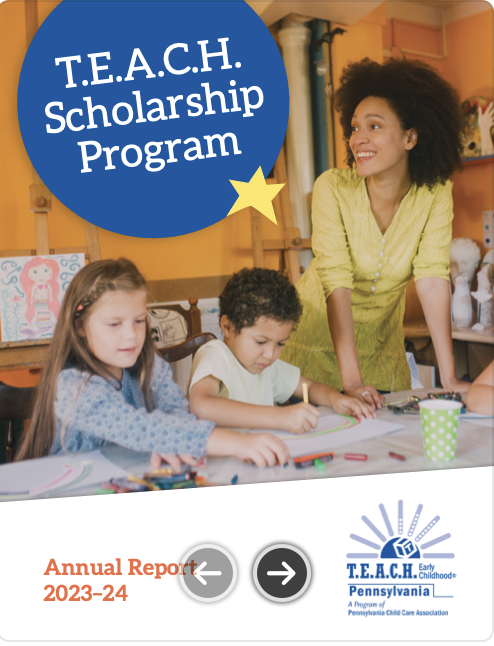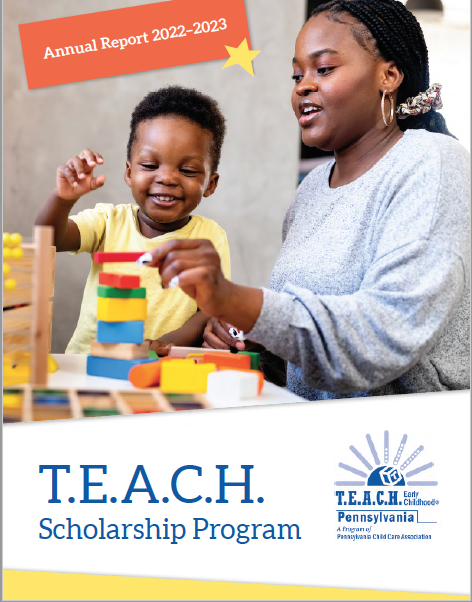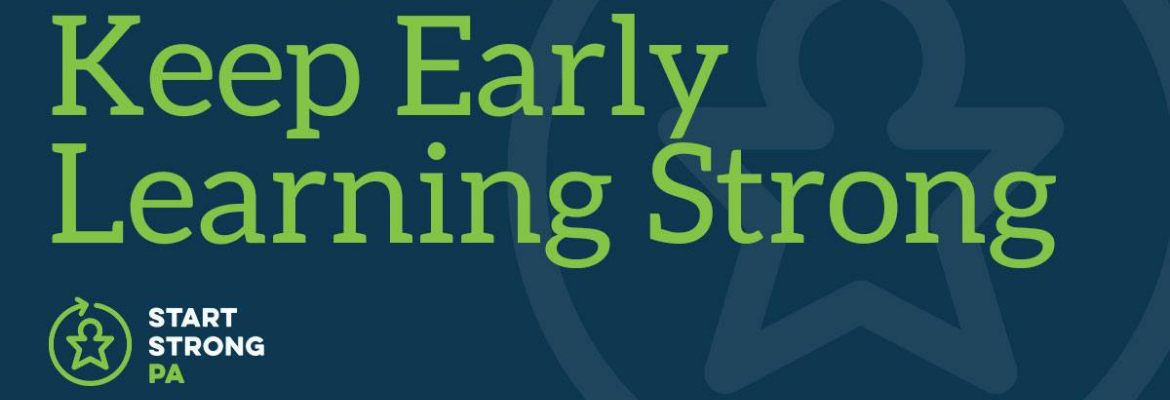Annual Report
TEACH FY 2024-2025 Annual Report
View the TEACH Impact Summary for FY 2024-2025 HERE! The TEACH Early Childhood® Pennsylvania Scholarship Program (TEACH) offers early learning professionals a debt-free higher education, supporting them while they work to become stronger teachers and earn thriving wages. TEACH is helping early education programs attract and retain teachers through a Grow Your Own approach. Through TEACH, child care programs invest in their teachers’ professional development, making them more likely to stay in the Early Childhood Education (ECE) field. Last year, 95% of TEACH scholars remained with their employers.
The TEACH Early Childhood® Pennsylvania Scholarship Program (TEACH) offers early learning professionals a debt-free higher education, supporting them while they work to become stronger teachers and earn thriving wages. TEACH is helping early education programs attract and retain teachers through a Grow Your Own approach. Through TEACH, child care programs invest in their teachers’ professional development, making them more likely to stay in the Early Childhood Education (ECE) field. Last year, 95% of TEACH scholars remained with their employers. In FY 24-25, TEACH scholarships supported 956 early learning professionals at 563 child care programs across the Commonwealth. Scholars earned 13-14 credits last year, with an average GPA of 3.4 (associate degree) and 3.68 (bachelor’s degree). Associate degree scholars increased their earnings by 11.1% and bachelor’s degree scholars increased their earnings by 10.3%.
Read more about TEACH scholar successes in the full Annual Report.
TEACH Pennsylvania is supported by the Office of Child Development and Early Learning (OCDEL) of Pennsylvania’s Department of Human Services (DHS) and Pennsylvania’s Department of Education (PDE).
TEACH FY 2023-2024 Annual Report
View the TEACH Impact Summary for FY 2023- 2024 HERE!
In FY 23-24, PACCA provided scholarships to 910 early learning professionals employed in 560 child care programs across the Commonwealth. Scholars earned 13-15 credits last year, with an average GPA of 3.34 (associate degree) and 3.60 (bachelor’s degree). Associate degree scholars increased their earnings by 14.6% and bachelor’s degree scholars increased their earnings by 12.6%.
T.E.A.C.H. also helps sustain the child care workforce by helping employers recruit and retain teachers. Through T.E.A.C.H., employers can support early educators to earn higher degrees, advance in their careers, and increase their wages so they can stay in the field. Despite the ongoing child care staffing crisis, sponsoring employers experienced a 95% retention rate of their scholars last year.
Click here to read the full report on the impact of T.E.A.C.H. for Pennsylvania's early childhood workforce and early learning programs, as well as stories from current and past participants.
T.E.A.C.H. Pennsylvania is supported by the Office of Child Development and Early Learning (OCDEL) of Pennsylvania’s Department of Human Services (DHS) and Pennsylvania’s Department of Education (PDE).
T.E.A.C.H. 2022-2023 Annual Report
PACCA Releases FY 22-23 T.E.A.C.H. Early Childhood® Pennsylvania Annual Report

In FY 22-23, PACCA partnered with 45 higher education institutions to provide scholarships to 985 early learning professionals employed in 580 child care programs across the Commonwealth. Scholars earned 13-15 credits last year, with an average GPA of 3.26 (associate degree) and 3.63 (bachelor’s degree). Both associate and bachelor’s degree scholars increased their salaries by 15%. Sponsoring employers experienced a 95% retention rate of their scholars.
Click here to read the full report about the impact of T.E.A.C.H. for Pennsylvania's early childhood workforce and early learning programs.
T.E.A.C.H. Pennsylvania is supported by the Office of Child Development and Early Learning (OCDEL) of Pennsylvania’s Department of Human Services (DHS) and Pennsylvania’s Department of Education (PDE).






